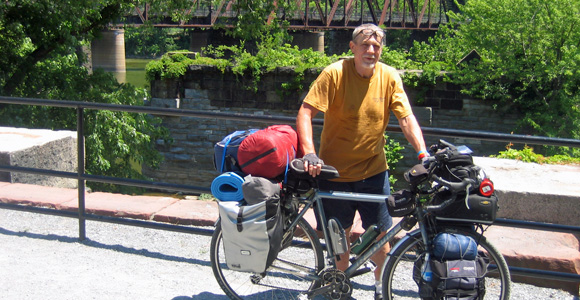I have observed quite amazing transformations in people after their weight loss surgery. Some of the most intriguing stories are of patients who left their sedentary lives behind on the operating table and are now embracing very active lives. Often these new lives involve participating in physical endurance activities such as marathons, duathlons or triathlons.
Today I am interviewing my good friend and marathon runner Chuck Gough. Chuck and I met at our bariatric center’s support group and cycle together. Earlier this summer, Chuck and I cycled the Great Allegheny Passage and Chesapeake and Ohio Canal Trails from Pittsburgh to Washington D.C. Chuck’s story is quite interesting. Chuck was walking with the assist of a cane as a pre-op. A year post-op he was running his first marathon.
[Tom] Chuck, welcome to my blog. I know my readers would love to hear more of your story. Can you share with us how you came to run a marathon just a year out of surgery?
[Chuck] Well basically once I was able to start exercising again after surgery I started jogging some. I signed up for a few 5K’s and It seemed then each week I was challenging myself to go a little further and a little faster. 5K’s turned into 10k’S Then 15K’S. I started to ask myself if maybe in the fall I could do a half marathon. As it ended up I met a few people and before I knew it I had decided to train for a full marathon with the fall of 2010 being my goal to run the Akron Marathon.
[Tom] Running 26.2 miles is quite a feat that is beyond the reach of many accomplished runners. Without a doubt, you had to build a personal training plan to prepare for a run of this length. Can you tell us about the training leading up to the marathon?
[Chuck] After several months of aimlessly running on my own, not really knowing how to accomplish the ultimate I joined up with a group of runners and a class at the University of Akron called Marathon 101. It was here that I was finally introduced to not only a full training schedule but educated on how to prepare for a long run. It was then I started an intense 18 week training schedule to increase mileage with the ultimate goal of running a full marathon.There was a twist in the sense I required the same nutritional and fluid intakes as any other runner. Being a post operative gastric bypass patient I had to learn a whole different way accomplish these requirements as pasta loading and drinking large quantities of fluids were not possible. Much of the sports drinks and dietary supplements such as GU are loaded with sugar and caffeine. By taking these it was causing me to feel sick like dumping syndrome and because my stomach would be upset I was then unable to get the fluids in and I was hitting a wall at about 16 miles.
[Tom] Beyond the obvious physical challenges, there are certainly dietary and nutritional challenges unique to the bariatric runner. Can you tell us a little about the challenges you personally faced and how you overcame them?
[Chuck] As mentioned before any runner requires certain nutritional aspects and fluid intake to get them through a long run. But as a bariatric patient I wasn’t able to do certain things like a lot of runners do like load up on carbohydrates the day or two before. I physically couldn’t eat enough.So starting roughly 4 and 5 days ahead I would start eating higher carb meals with rice and a few potatoes for instance. I would also boost my protein and vitamin D and potassium. On long run and race days I had to experiment a lot around to find the right combination of supplements to avoid taking GU and other supplements high in sugar and caffeine.
What I found that worked for me is I make peanut butter squares roughly 2 or 3 sandwiches worth, carry honey squeeze packs, a salt pack. The for my fluids water can’t be the only thing so I carry a couple bottles of water and then dilute Gatorade to about a 50/50 ratio. Now since I can’t chug a bunch of fluids down at water stops I basically found that from the time the bell rings I start sipping water and rotating that with the Gatorade.
This within a few miles then I start eating the peanut butter squares to keep a little in my stomach at all times. I also try to have a place or a person along the route that is able to hand me over a banana to eat about half way through. If my muscles start to cramp because of the salt intake being lower with the diluted supplements I will quickly toss a salt pack in my mouth chew it up and whish it around with a little water and then spit it put. It almost instantaneously stops cramping and gives me a new lease on my legs.
To sum it up is before a race I have to ramp up over several days to a week to get my glycogen stores built up. Then on races day I have to basically keep my fluids and protein coming the whole race. My first marathon I struggled dearly with these needs but once I found the right combination for me I ran my second marathon and was able to take roughly an hour of my time.
[Tom] I personally know that you are a highly motivated person who is always looking for a new challenge. What physical challenges are on your bucket list that you are planning to conquer in the near future?
[Chuck] I am looking at doing some longer bike rides and really looking at hiking the Appalachian Trail. One of my overall goals is to circumvent Lake Erie with a combination of bike and running. Kind of like doing biathlons day after day for 750 miles. I still don’t know exactly. I think an ultra-marathon and sprint triathlon is something I am looking at doing in the next year. Aside from that I am looking forward to skydiving and getting my open water certification scuba diving.But I think my biggest challenge I am trying to work out in my own mind it to help others. Not only bariatric patients but others that may be recovering from illness. Or people just looking for ways to become more active so they can enjoy life. I have a friend that had a bone marrow transplant for instance and he is slowly trying to get back on his feet. I hope to be able to get him to start walking with me soon.
I love the outdoors and most of my free time I can be found in the parks either biking running hiking, fishing swimming, camping and in the in the winter snowshoeing. I also love being with people so the more the merrier.
[Tom] Often bariatric patients lead a sedentary life before surgery. It can be intimidating to break that mold and be a more active person. What advice would you give bariatric patients who want to be more active after surgery?
[Chuck] I didn’t start big I started slow. Before my surgery I had to use a cane to get around quite a bit. One of the first things I did was hire a trainer to help me relearn how I could help regain my balance and build core strength. Then I started walking. Fiddling around in the yard and walking my dogs. Next when I felt I had enough balance again I bought a bike and started riding short distances and started jogging short distances. I suddenly found a competitive spirit in myself to try and do just a little more each day and started keeping logs. I started wearing a pedometer everyday and can hardly ever been found without one on and or a GPS to keep track of my daily activities.
[Tom] How do you define success as a bariatric patient and how do you work on being that successful weight loss surgery post-op?
[Chuck] I would define success as a bariatric patient simply by asking yourself if you’re happy. Maybe not right away but a few months or a year after surgery. Once all the rapid change is over and you have stabilized more.I always reflect back one night at the gym when an acquaintance said something to the fact that we sure put ourselves though a lot so we can live a day or two longer. I told him that I don’t exercise and get out so I live a longer life although that could be a benefit. I exercise and became active to enjoy the life I have left more I have taken my activities to the extent that not only am I getting the exercise but I am doing it all with activities that have become my passions and incorporated it all with my love of the outdoors.

Chuck thanks for taking the time sharing your thoughts with my readers today. As I mentioned earlier, Chuck’s story is quite amazing. He sets the bar high for other bariatric patients following in his footsteps. You can learn more about Chuck by following the following links.
- Akron Beacon Journal feature article
- Summa Health System Bariatric Center Video
- Crossing Mountains Bicycle Touring Blog


Great article and great advice from Chuck on the nutrition , I have really been looking for info like that. I’ve been reading your blog for a bit now and have also taken up mountain biking, which I love. Thanks!
Glad you enjoyed Chuck’s interview. He is a wealth of info for bariatric patients who run and cycle. He also loves to share this knowledge. I am sue he would love to hear from you. You can reach Chuck at chuck@crossingmountains.com.
Great article. I, too, had bariatric surgery about 6 months ago. I started training for my first half marathon about 8 weeks ago. I do struggle with what I will need the days leading up to race day and race day. Thank you!